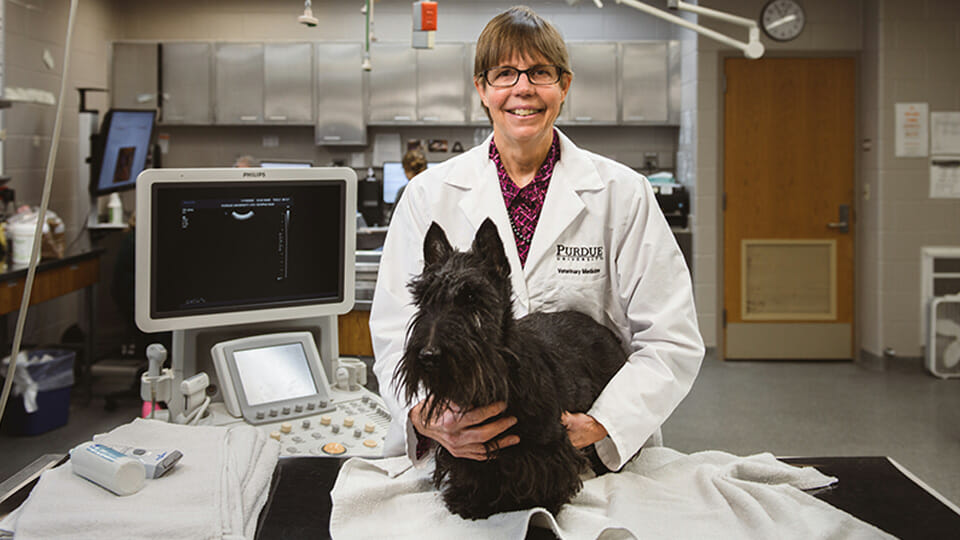$10M gift to PU vets helps human and canine cancer
Subscriber Benefit
As a subscriber you can listen to articles at work, in the car, or while you work out. Subscribe Now
A beloved family pet that battled cancer led its owners to Purdue University veterinarians, who extended the dog’s life by more than a year. It prompted the successful Brown County entrepreneurs to recently gift the college $10 million. The donation is creating the Evan and Sue Ann Werling Comparative Oncology Research Center, devoted to sniffing out advances in dog cancer that could also benefit humans. A Purdue oncology leader says the gift from the animal-loving Hoosier couple “is going to transform what we do”—advancing the field for both furry family members and their people.
The successful business couple turned around a struggling printing company in Terre Haute, building it into a booming enterprise that ultimately printed covers for National Geographic books and textbooks. The Werlings sold the company in 2005, enabling them to devote more time to their passion for animals. They adopted more than a dozen cats and dogs and nurtured them back to health—including their rescue dog Brandi, who ultimately inspired the gift that will create the center.
It will be based in the College of Veterinary Medicine and partner closely with the Purdue Institute for Cancer Research, reflecting the mutually beneficial nature of comparative oncology. The center will greatly enhance the Purdue Comparative Oncology program, which leaders say has outpunched its weight since its creation in 1979.
“Certain forms of naturally occurring cancer in dogs are very, very similar to those same forms of cancers in people,” says Purdue Distinguished Professor of Comparative Oncology Dr. Deborah Knapp. “When we learn something new that could help a dog, that could potentially then go on to studies in humans and potentially help humans.”
Knapp has been studying bladder cancer in dogs for 30 years and helped extend Brandi’s life when the Werlings hunted down Purdue vets to find the best treatment possible. While that was in 2005, Knapp has since significantly advanced her work in the disease and recently completed a study that is “a dramatic step forward.”
“[Bladder cancer] is a field where there’s so much need to make progress in humans and dogs,” says Knapp, who is also director of Purdue’s comparative oncology program. “And it’s a field where the cancer in dogs and humans is very, very similar, and so this is an opportunity.”
For humans and dogs alike, bladder cancer is typically not diagnosed until symptoms arise, “so [in dogs], the cancer is usually pretty advanced within the bladder, and in some cases, has already spread,” says Knapp. The prognosis is similarly grim in humans.
“At that stage, drugs won’t work as well, so we said what if we can find it early [in dogs]?” says Knapp. “It should respond better.”
Man’s best friend—and one breed, in particular—may help researchers find answers even faster than studying humans. Scottish Terriers are 20 times more likely to get bladder cancer compared to other dogs. The Scotties community came out “in a big way” to support Knapp’s study, some driving the dogs hundreds of miles to participate in the trial.
Rather than waiting for symptoms to appear, Knapp’s study began screening the 120 participating Scotties for bladder cancer beginning at age six with ultrasound exams and urinalyses twice per year. Thirty-two of the dogs were found to have early-stage bladder cancer, and their response to treatment—even though it was “very conservative” treatment—was staggering. Typically, dogs have about a 20% remission rate when they’re not treated until symptoms appear, but Knapp’s Scotties more than doubled the typical remission rate.
“I would’ve guessed maybe we’d go from 20% to 30%, but to double the remission rate—that’s a big deal,” says Knapp. “It’s very, very unsual in vet oncology—and probably in human oncology—to see a new treatment that works twice as well as your old treatment; it’s really astounding. We think those early tumors are just a whole lot more sensitive to being killed than later tumors.”
Interestingly, the compressed life span of dogs can also speed research; Knapp says a similar study in humans would take about 15 years, but “dog years” helped Knapp complete her study in just three.
“We need to do more than [just treat the dogs that come into the clinic]; if we don’t, 10 years from now, we won’t know any more and we won’t be able to do any better than we’re doing now,” says Knapp. “It’s too easy for many clinicians to be too consumed treating dogs to [do research]—and that’s where the center comes in. So five years from now, we’re better off than we are today.”
Knapp says the $10 million gift “is huge,” because it’s also creating an endowment for the center, meaning it won’t have to rely solely on grants and other gifts.
Knapp says a cancer study in dogs can often produce faster results than trying to find the same answer by studying humans.
